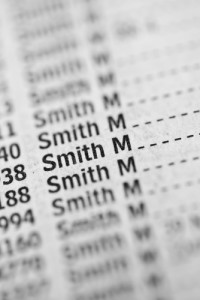WhitePages Gets Its Inevitable Section 230 Win–Nasser v. WhitePages

Photo credit: Smith name in phone book // ShutterStock
Because the erroneous information came from third parties, WhitePages isn’t liable for it per 47 USC 230. The magistrate judge recognized this and recommended dismissal. In a surprise twist, the judge didn’t agree, saying that it would decide the Section 230 question only after closer factual review. Six months later, the judge came back to the magistrate’s result from almost a year ago: case dismissed per Section 230.
WhitePages adequately showed that it got the data in question from third parties. The court says it doesn’t matter that WhitePages paid third parties for the data (citing Blumenthal v. Drudge). The court also rejects Nasser’s notice-based liability argument. Finally, the court reinforces that Virginia doesn’t recognize promissory estoppel, so Nasser’s Barnes-style workaround also fails. The court concludes:
To be sure, it is unfortunate that Michael Nasser’s home telephone number was erroneously linked to the Comcast number and that he and his wife were subjected to incessant phone calls from cable telephone customers. It is likewise a shame that it took Verizon and WhitePages so long to recognize and correct the error. It is no wonder that Nasser experienced exasperation and frustration. Regardless of the magnitude of his irritation and his attendant alleged health concerns, however, the law does not afford Nasser a remedy against WhitePages.
Case Citation: Nasser v. WhitePages, Inc., 2013 WL 6147677 (W.D. Va. Nov. 21, 2013)
[Note: Venkat is representing WhitePages, but he played no role in preparing this blog post.]